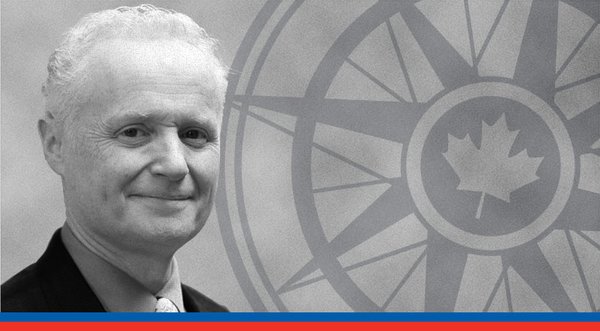My tutor at the LSE, Alan Beattie, who guided me through two graduate degrees (an M.Sc and a Ph.D.) at the School, died quite unexpectedly a few weeks ago in his home in London. I had the honour of speaking to a group gathered to celebrate his life and work last week at Hugo’sRestaurant, one of Alan’s favourite haunts, in Queen’s Park. Here is what I had to say about this wonderful man and mentor who influenced me deeply and whose loss is a grievous blow:
Alan Beattie
Thank you to Liz and Josh for having given me the opportunity to say a few words about Alan Beattie, whose life we have rightly come together to celebrate.
Alan Beattie changed my life. Not just a little. Fundamentally. So much in fact that I can say honestly that I am not the same person I was when we first met.
When I came to London on a Commonwealth Scholarship 35 years ago I knew nothing of Alan Beattie. It was only by the purest happenstance that I signed up for a couple of Master’s courses he (and in one case John Barnes) were teaching. Here are just a couple of stories about how Alan, in his quiet but purposeful way, left me transformed.
I was to deliver a paper to our seminar on the British constitution, but as I was headed out the door I suddenly realised I could not lay my hands on my seminar paper. I tore apart my room and that of my then girlfriend desperately seeking that paper. I did not succeed and I had the humiliating experience of calling Alan in his office where the seminar group was waiting to explain that I would not be able to make good on my commitment. Almost as soon as I put down the phone, I discovered the paper, which had fallen down between the wall and my girlfriend’s bed. This was doubtless karma for having mixed graduate student sex and graduate student research.
Be that as it may, as soon as I found the paper I ran out the door and all the way to Alan’s office with it clutched in my hand. I knew it was too late to rescue the seminar, and yet for reasons I cannot really explain I felt that I absolutely needed to prove to this man that I had been telling the truth and that I did have the paper ready in time. I burst in the door to his office in Lincoln Chambers and told him my mission, and he gave me one of his wry little smiles and said that it really hadn’t been necessary. It clearly had not occurred to him that I had been anything but truthful and that small expression of faith in me, a student he hardly knew, meant the world to me.
When I got a first for my M.Sc. Alan told me that the Government Department wanted to encourage me to stay on and do a doctorate. I was flabbergasted. Such a departure in my carefully planned professional life had literally never occurred to me, but I loved the LSE and I loved London and I loved working with Alan and so I said yes, closing the door forever on the career in the law and possibly politics that had always been the basic assumption of my working life, proving conclusively that life is what happens while you are making other plans.
But then what to do for a Ph.D.? Alan said “what are you interested in?” Remember that this was 1982, and so Margaret Thatcher’s first term as PM was drawing to a close. I said that I wanted to establish the intellectual vacuousness of Thatcherism. Alan said, “Oh, then you want to do a thesis on Friederich Hayek.” I said “Who?” And I have spent the ensuing 30 years in an internal dialogue with Hayek, trying to understand the enormous intellectual scope as well as the practical and philosophical impact of his work. And like Tom Sawyer’s young friends, I came to jeer, but I stayed to whitewash. So Alan’s guidance also served to transform me as an intellect.
As a teacher too Alan left his mark. It was not at all unusual for him to write a short essay in response to a draft chapter of my thesis, and my next chapter would essentially be my response to the points he raised in his essay. His comments were always gentle, but incisive and uncompromising, and were designed to praise and encourage me while at the same time eliciting the higher standard he always made me believe I could achieve. As a young graduate student I lived in fear of those lunches in the pub, the George IV, where he would invite me to deliver his latest dissection of one of my chapters, and yet I always left them strangely exhilarated because he skilfully but quietly challenged me but never so much that I couldn’t gather my wits and fashion a response that would get us to the next stage of where he wanted us to go.
This is not to say that he suffered fools gladly. I remember fondly a political thought seminar I attended where a pompous visiting professor delivered a talk on Ostrogorsky’s work on political parties from the late 19th and early 20th century. This professor was of the view that Ostrogorsky had been undeservedly forgotten. Alan launched a withering critique of Ostrogorsky’s understanding of British political parties during the question time with the biting observation that sometimes the obscurity into which thinkers fall is richly deserved.
The mark Alan left on me as a future teacher was very much in my mind the day I first worked with a teaching assistant in Canada. I wasn’t sure how to establish with my assistant the standard I wanted to apply to marking my students’ paper, so I thought the solution was to divide the first pile of scripts in two, to give him half, and then to compare our marking. I got his scripts back and pulled one out at random. He had written, and I quote “I looked for a reason not to give this paper an F. I failed and so did you.” We had a little heart-to-heart about my (and by extension Alan’s) philosophy of marking…
Indeed it was not unusual for me to give a paper an A and then to write a whole page of comments or even two, to the wonder and consternation of my students whose experience had been that extensive comments were evidence of a paper gone badly wrong. In my case, however, it was simply Alan Beattie, speaking through me to my students, in the way that he had spoken to me.
In everything I wanted to do in my life, Alan set a standard which I aspired to meet. All too often I fell short, but I had only to visualise him across from me over lunch in the pub, patiently and gently showing me what I needed to do to satisfy his expectations, and I redoubled my efforts, confident that if he thought I could do it, then I could.
Alan’s kindness, discipline, hard work and intellectual rigour became the touchstones of my professional life. He set my intellectual and professional odyssey on a course so different from what I had planned that I could not even have conceived of it on the day I arrived at the LSE. He may no longer be among us, but he and his influence live on in me and in the many others whose minds and lives he helped shape during his years at the School.
Brian Lee Crowley
Alan Beattie’s student 1981-85
Hugo’s Restaurant, Queen’s Park, London, 8th April 2015



I too studied under Alan in the early 80s. A lovely man.
Hello Peter. How lovely to hear from you. I worked with Alan from 81-85 (M.Sc. and then Ph.D.). How about you?
Cheers,
brian